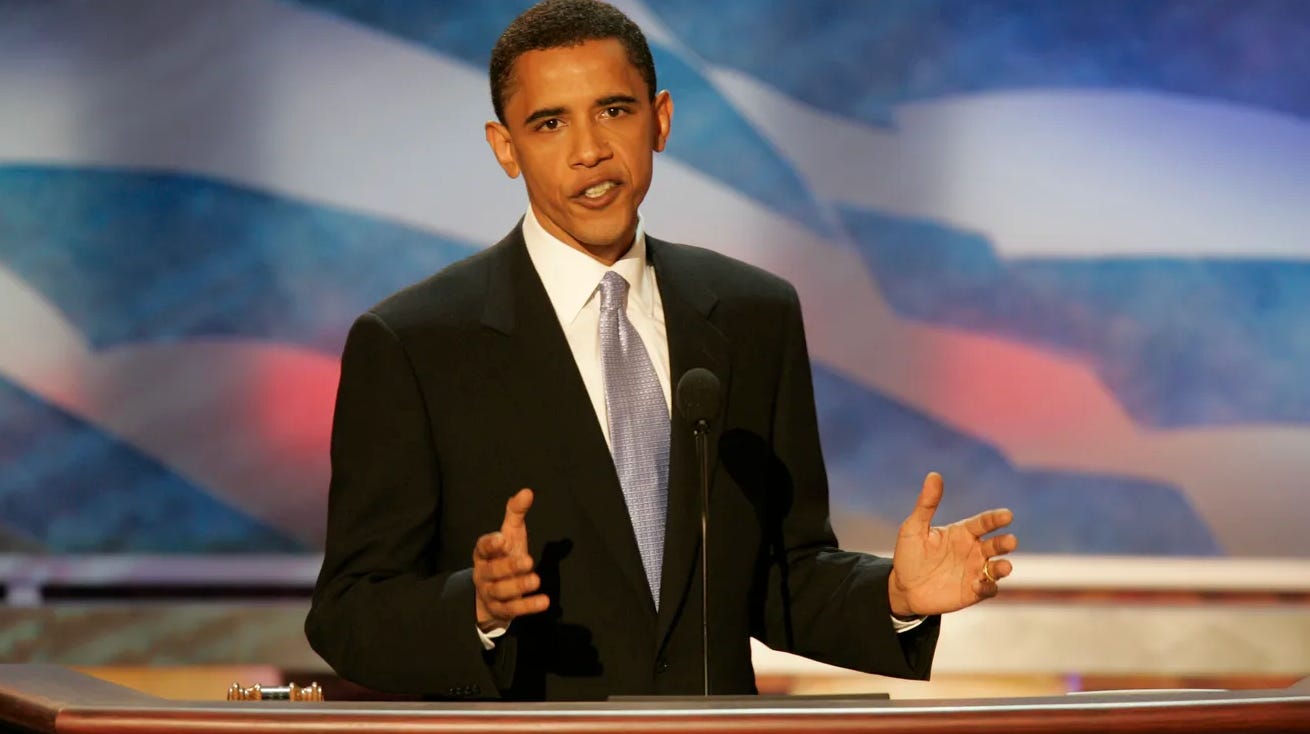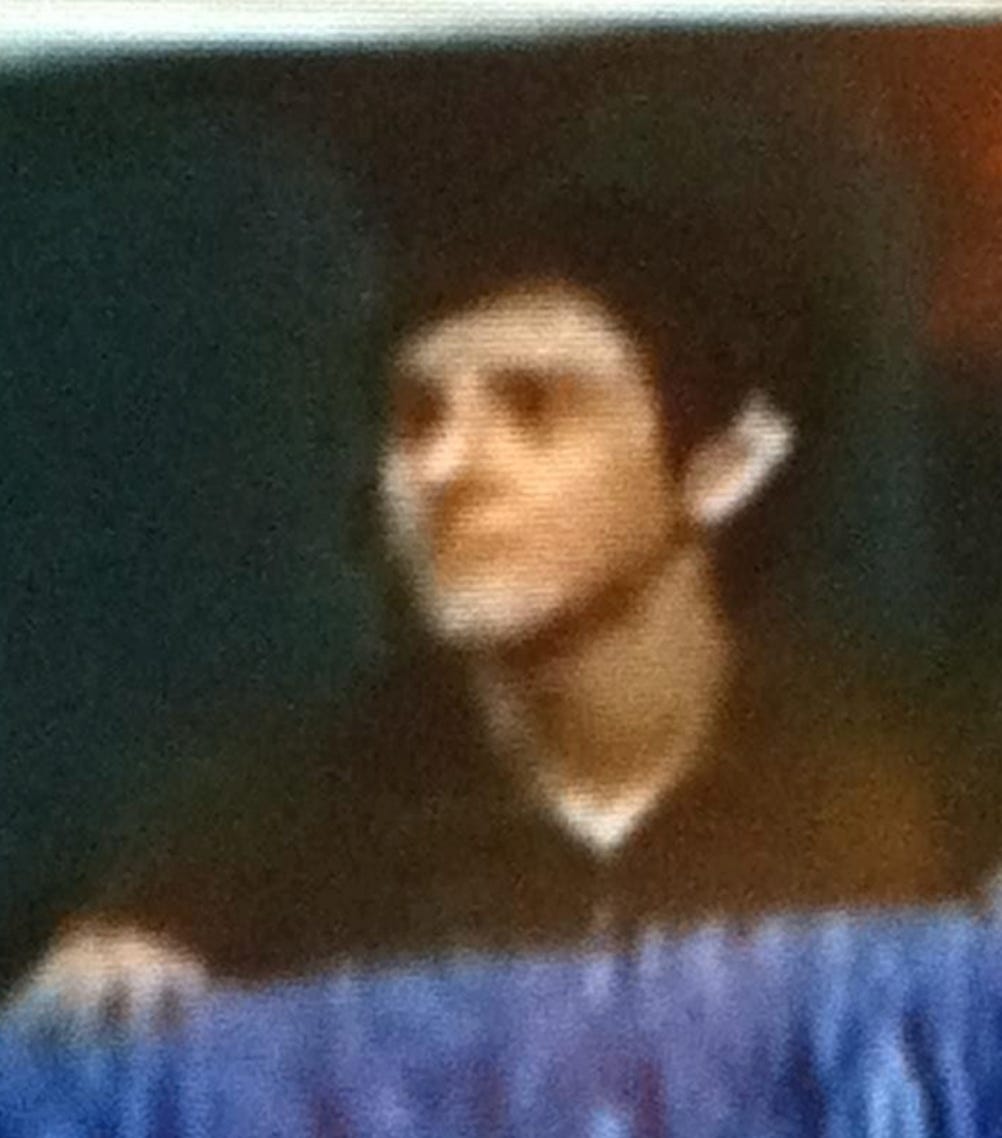Why I Write About Politics
And when I learned to care about the future of my country

I was eight years old and it was during the 2004 Democratic National Convention that my dad came into my room and woke me with an uncharacteristic gleam in his eye. It was hard for me to imagine what he would want to show me that it was worth practically pulling me from bed at that late hour. But emerging drowsily from my cozy sheets and being urgently ushered into our living room, it wasn’t exactly the Christmas come early that I’d hoped.
I rubbed my eyelids, still half asleep, as I looked toward the speaker on the TV screen. He was already mid-speech. The man who addressed America that night was tall and spoke with a mixture of booming charisma and warmth. And he was Black. I didn’t think much of that, though. I grew up in a diverse town and even at that young age had friends of varying hues.
The concepts Barack Obama addressed that night were by and large a mile above my head. He spoke in a political dialect that I didn’t have the vocabulary or understanding to properly parse. But those loose and hovering concepts about freedom and equality and the fight for an America we could each feel represented and safe inside of managed to stick with me.
Tears welled in my dad’s eyes as he turned toward me and said, “Ben, that’s going to be the first president you ever vote for.” An awe-inspired certainty penetrated his slightly quavering voice. The thought of that older me voting for the first black president moved him deeply. It may have been the very first time I saw him speak hopefully about our country’s future.
The image of that kind and idealistic Illinois senator lingered — as well as the bold contrast he seemed to represent from the only leadership I’d ever known. At eight years old, I didn’t know much about our country except that its president wasn’t one who my family could feel very proud of.
But my dad made sure I watched enough of the news to have a sense of what was going on. When I asked questions, he paused and tried his best to bring me up to speed.
A few months after Bush’s re-election, my mother, father, and I took a train into the city to protest the war in Iraq. I stood beside them at waist height as we held picket signs and chanted about peace, bringing our troops home, and the dire need for stronger leadership.
But that reality my dad prophesied during that 2004 Democratic Convention came sooner than he expected. I wasn’t yet in Jr. High when Barack Obama was elected president. My parents cheered in the streets as fireworks burst over the skyline of Philadelphia.
The country was ready for the first black president nearly a decade before my dad believed we had it in us. I didn’t even have the opportunity to vote for Obama when he ran for re-election in 2012. I was only a sophomore in high school.
Sensing an anomalous interest in the politics of my country, my history teacher asked if I wanted to participate in a mock debate that would take place in front of the entire school. My role would be small but I eagerly leapt at the opportunity.
I portrayed a moderator, wrote my own questions, and nervously asked them to the two students that stood on stage during that fateful October day in 2012. The backstage smelled of wood, dust, and old velvet, and the auditorium was clammy enough to lull the sleepiest kids into comas as they sat upright in their seats. The timeless, dimly lit room was one that my own father had funneled into fifty years prior. The chairs had hearts and doodles and light acts of vandalism etched into their wooden frames and they creaked as each student settled in.
The room had a personality even on less momentous days. Banners from different decades lined the walls and told tales of bygone times. But on that brisk October morning, the sleeping giant glowed in sepia-tone orange as my legs quietly jittered beneath the table on the right side of our auditorium stage. A blue cloth was draped over it, and on the other side of the stage, a table adorned in red. Between the two tables were two mock podiums, and two students behind them. They wore the weight of the day with the confidence of statesmen.
The spotlights turned toward us. When it came my turn to speak, I anxiously recited my pre-written questions into my microphone and addressed the two boys on stage portraying our presidential hopefuls, both of them a year or two my senior and both of them brilliant through and through.
It was my first real exposure to the political process, however meager my participation. Rather than standing beside my parents as they walked into voting booths on Election Day, I got to feel like a part of things.
I played a small role in helping a body of soon-to-be-voters to understand more about the country that they were walking into. It was the first time I was ever on the news. My appearance was brief and the pre-smartphone photo documenting the event hasn’t aged terrifically.
But it was clear that a fire had begun to stir inside me.
Yet back then, sparing a couple of discouraging volunteer stints managing phone lines and databases, I had few places to channel my thoughts beyond Facebook screeds and heated online political debates. The fire remained directionless.
Finding that direction wasn’t easy. It demanded a healthy few years of writing pieces destined for digital garbage bins, participating in futile arguments that led nowhere, and simmering in the quiet frustration of watching the world spiraling faster than I could ever hope to slow.
Gradually, though, I’ve begun to grasp that the point isn’t to have all the answers — or to fix everything in one fell swoop. It was to be a voice in the choir. It’s being one of the people who refuse to settle with the “up is down” lunacy of an insurrection-inciting felon occupying our nation’s highest office.
By the time Trump was elected again in 2024, the fog around this country felt heavier than ever before. And I hoped I could offer insight with my words. I hoped I could provide clarity or guidance. I hoped, some days, I could even offer… hope. The embers that began to fester in early high school had become a tool I’d try to harness every other time I’d sit down at a computer to type.
The entire institution of journalism is threatened, and more and more often, it falls on independent writers to keep people informed on what’s going on in the country and world. To prevent authoritarian narratives from taking hold. To let people know that they’re not alone in their fears.
I don’t have a massive platform or a fancy title just yet. But with my Substack account, I can try my best to prove what the human voice still has to offer. How it can penetrate the noise of AI-generated drivel when done with care and passion. How it can combat the deluge of insidious misinformation that’s taken America hostage.
Maybe my optimism is naive. Maybe my belief in my capacity for change is unfounded. I know it’s not a grand gesture or a sweeping act of resistance I’m providing. But it’s what I can do.
If you enjoyed this article, you can support my work on here for under $2.00 a month. It would make an enormous difference in helping me to bring you the quality writing you deserve during these times when journalism is under attack.



Ben, I agree with other folk; this piece ranks among your best, and I believe I've read all of them, if not commented on each. We are indeed in dark times, and yes, the air is heavy with the stink of Donald Trump. With just a week in office, he has sowed chaos in every corner of the nation and has installed his ne'er do wells in almost every government office. We should be afraid. I know I am. Keep writing. I don't have the strength to write politics anymore. Maybe that will change. Maybe it should.
You’re doing great! Keep at it. I’m an old woman who did vote for Obama. Makes my heart swell to hear young voices speaking truth to power. ❤️✌🏻